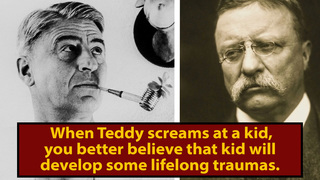Teddy Roosevelt Scarred A Young Dr. Seuss For Life

Our personal peccadillos can often be traced back to our childhoods when experiences burrow deep our mushy kid brains. But it's often not clear which minor and/or random event triggers people's many kinks, obsessions, and phobias. Other times, the causality is straightforward, because when a sensitive, artistic young boy has President Theodore 'The Bull Moose' scream at him to get off his stage, you better believe that kid will develop some lifelong traumas
It's common knowledge that Dr. Seuss wasn't a doctor, but neither was he really a Seuss. Born Theodor Geisel (Seuss was his mother's name), the future whimsical rhymer grew up German-American in the shadow of World War I. The Geisels didn't fare well under the national anti-German sentiment from "real" Americans, who deemed every Fritz and Jane the enemy and, in the tradition of that particular American' brand of patriotism, renamed sauerkraut to "liberty cabbage."

But the Geisel's bled red, white, and blue (three colors Seuss would often experience when being chased by brick-wielding bullies). To prove this, a 14-year-old Seuss started selling war bonds through his scout troop. His biggest customer was his own granddad, who spent $1,000 (which, in 1918 money, could buy you a lot of cocaine) to convince their neighbors their house wasn't worth firebombing. The tactic paid off: Seuss became one of the ten top salesboys to get a medal from none other than former President Teddy Roosevelt, cartoonish alligator wrestler and hero to every young boy in the country.
Don't Miss
While George Seuss indubitably had been looking forward to his (almost) namesake pinning a medal for being the Best American on his scrawny chest, the event took a turn for the worst. When the 60-year-old T.D. reached lil' Seuss, he no longer had any medals to give out -- one may have gotten lost inside of his massive jowls. Roosevelt, a calm and measured man, immediately thought the boy had either been put there by mistake or snuck onto the stage. Not bothering with other scenarios than think one or think two, the walking symbol of hyper-Americanism demanded that the only German-American boy be removed from the stage. "What's this little boy doing here," thundered Roosevelt, the humiliating heckle flecking his stache with spit.

And to Seuss and his family, he might as well have said, "What's this pencil-dicked pile of sausage grease and liberty cabbage doing on my All-American stage?" The family returned home crestfallen after Roosevelt's badgering, but none were more traumatized than Seuss himself. He later recalled that this encounter with the Teddynator gave him a lifelong stagefright, and Seuss would often refuse to do any type of public speaking engagements or stage readings. But being tossed off by the Bull Moose didn't deter Dr. Seuss from expressing himself fully, if not to show his true patriotism in a less confrontational way than standing on a stage …

Or find a way to once again feel love for a ruddy, mustachioed champion of the outdoors ...

Oh the tangents you can find, if you do not stay behind on Cedric's Twitter.
Top Image: Public Domain